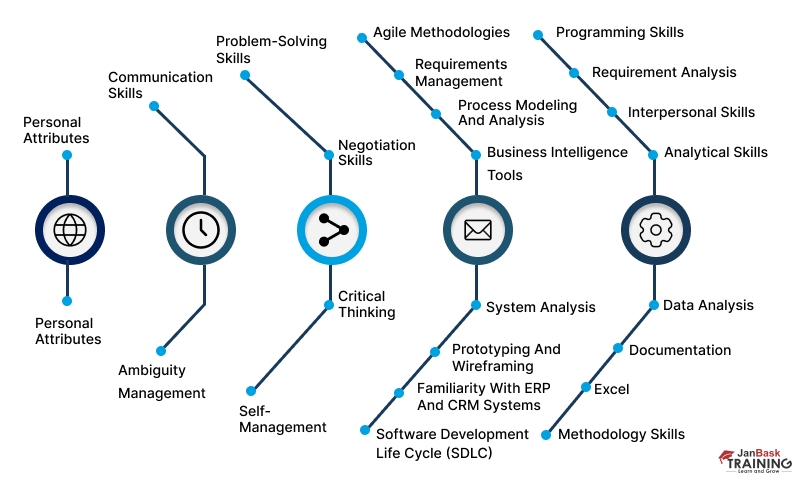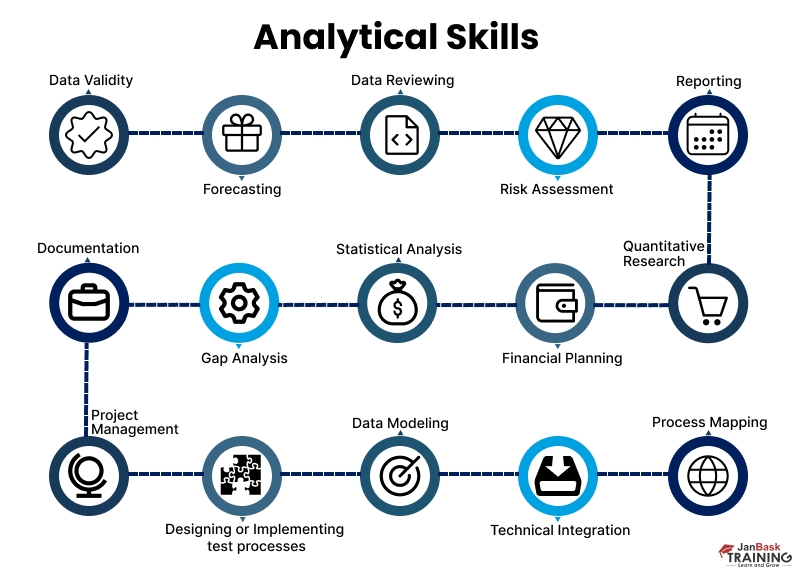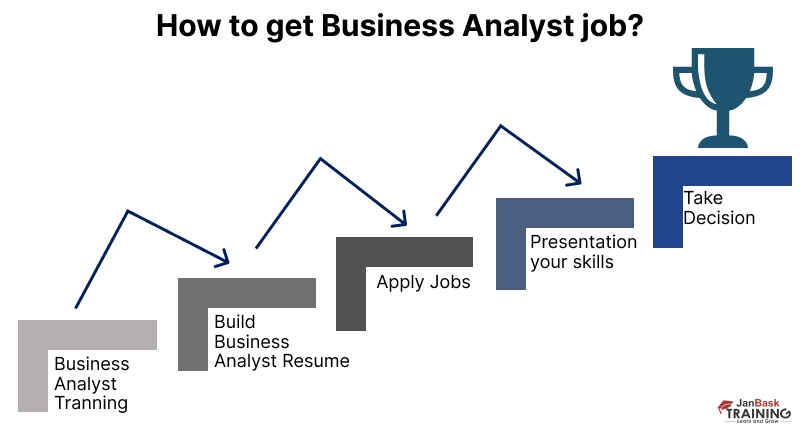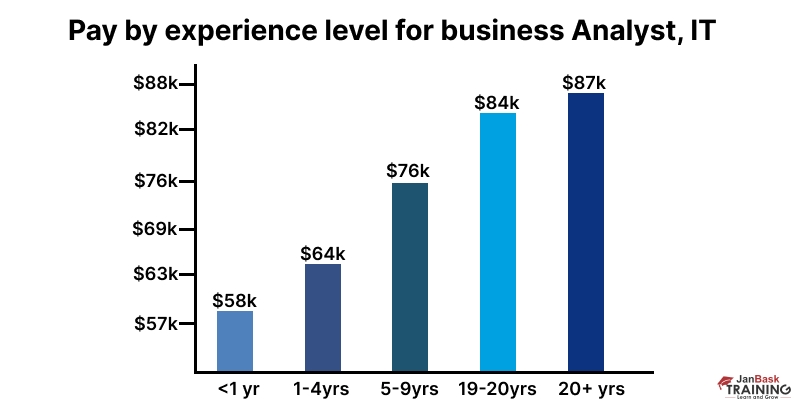Introduction
Are you considering a career as a business analyst? If so, it's essential to understand what is needed to succeed in this field. A competent and competent Business Analyst has the skills, knowledge, and understanding of their industry and technical know-how to evaluate activities of various business functions such as human resources, marketing, finance, or operations.
Becoming an effective Business Analyst requires more than having good academic qualifications - it demands a solid commitment to learning new analytical tools and techniques. In this blog post, we'll share the top qualities and characteristics that every Business Analyst needs. So whether you're just getting started on your journey or are already well on your way down the path, read on for tips on becoming a certified business analyst.
Who is a Business Analyst?
A Business Analyst is a professional who acts as a bridge between business goals and technological solutions. They develop strategic plans to improve business operations and productivity by analyzing data and identifying areas of improvement. A Business Analyst is skilled in understanding complex business processes, requirements gathering, and problem-solving. They collaborate with stakeholders, such as project managers, developers, and clients, to ensure successful project outcomes. This multi-disciplinary role requires expertise in various domains, including technology, project management, and communication skills. The Business Analyst is essential to any organization looking to improve and grow its business operations.
A Business Analyst is a connecting link between the IT and business teams. With their extensive IT skills, they analyze, comprehend, and evaluate the data and fetch the requirements and provide technical solutions accordingly, which add value to the stakeholders. They work closely with the technical teams to improve processes and the stems. The data they drive helps make critical decisions for the company, which can drive growth, productivity, profitability, and efficiency.
Top 26 Business Analyst Skills You Need To Excel in Your Career
Here, we will discuss 27 Business Analyst skills that can help you be workforce ready.

Technical Skills for Business Analyst
Analytical Skills – To develop Business Analysis skills, a business analyst had to work on multiple analytical tools. These tools are responsible for analyzing the design gap, effective implementation, and forecasting, etc. The list of common analytical skills includes – data reviewing, forecasting, gap analysis, financial planning, documentation, designing or implementing test processes, reporting, risk assessment, project management, data modeling, process mapping, quantitative research, technical integration, data validity, statistical analysis, etc.

Interpersonal Skills – You need interpersonal skills to help your team in working together and provide effective services too. A list of interpersonal skills includes – planning meetings, effective communication, presentations, influential statements, negotiation skills, reporting, verbal or written communication, and collaborative player, etc.
Requirement Analysis:- The common job role of a business analyst is analyzing business requirements thoroughly. But requirements are not created in a vacuum. It has to be discovered from stakeholders. This is the reason why communication skills are equally important when analyzing requirements for a project or business. There are two popular communication techniques you should follow when discussing with stakeholders. These are Discovery Sessions and the requirements review sessions. Further, requirements analysis can be performed at three different levels. These are Business-level, software level, and information level.
- At the business level, you usually have to work on business processes and create process flow diagrams.
- At the software level, you have to work on the functional requirements of the system and design use-cases or wireframes.
- At the information level, you have to work on business data and transform the same into meaningful content to make informed decisions.
Programming Skills - The most common Business Analyst technical skills needed for a BA job are VBScript, PERL, SQL, R, Python data visualization tools (Tableau, QlikView, and PowerBI), and Dotnet. Other than this, a BA should have a strong conceptual understanding to work on tough business problems that helps them to communicate with their team and stakeholders more confidently.
Methodology Skills - Another way to succeed as a business analyst is getting specialization around a methodology. The most common areas are agile business analysis, Six Sigma, Rational Unified Process, Business Process Modelling, etc. With specialized Business Analyst skills, it is easy to get the attention of recruiters and get hired quickly.
Excel – One of the most established and potent analytics and reporting tools is Excel. Excel is a tool business analysts use to create reports, perform budget studies, and perform a range of computations to identify market trends. Excel is a relatively simple program to use and understand. Business analysts can even use it to make choices and produce documentation. This is one of the major technical skills of business analyst.
Documentation – The record Business analysts evaluate data, provide reports, and produce documentation based on the data, therefore documentation is required. Business analysts can use documentation to make their points clearly and concisely in client and team meetings.
Data Analysis - Expertise in Data analysis tools and technologies, like SQL, Excel, data visualization tools such as - Tableau, Power BI, Statistical analysis softwares like Python, R, helps business analysts gain helpful insights from huge datasets and make data-related decisions.
Business Intelligence Tools - knowledge of Business Intelligence tools such as SAP BusinessObjects, Microsoft Power BI, etc. allows the business analyst to develop reports, dashboards, and communal visualizations to offer helpful insights to contributors.
Process Modeling And Analysis - Having familiarity of process modeling methodologies, like the Business Process Model and Notation (BPMN), and Process analysis tools such as ARIS, Visio, etc., helps the business analyst in mapping and analyzing business operations, identifying inefficiencies, and suggesting solutions.
Requirements Management - Expertise in requirements management tools such as JIRA, Confluence, IBM Rational DOORS, etc., helps the business analyst collect, document, track, and handle needs across the project life cycle.
Agile Methodologies - Having knowledge of Agile methodologies such as Scrum, Kaban, etc., and an understanding of Agile project management tools such as JIRA, Trello, etc. helps business analysts collaborate effectively with the development team, help in developing sprint strategy, and participate in Agile ceremonies.
System Analysis - Having knowledge of technical skills like Unified Modeling Language (UML) helps a business analyst examine and document the system needs, use cases, workflows, etc., effectively and efficiently.
Prototyping And Wireframing - Familiarity with tools such as Axure RP, Sketch, etc., to develop interactive prototypes, wireframes, mock-ups, etc., helps business analysts visually communicate needs and validate solutions with the partners.
Familiarity With ERP And CRM Systems - Familiarity with ERP systems such as SAP, Oracle, or CRM systems such as Salesforce helps a business analyst collect needs, determine integration requirements, and support implementation tasks.
Software Development Life Cycle (SDLC) - Knowledge of different phases of the software development life cycle helps business analysts work efficiently with development teams and ensure that the project execution takes place smoothly.
Soft Skills Needed for a Business Analyst
Communication Skills – Communication skills are one of the crucial skills among the business analysts skills BA spends ample time communicating with clients, users, management, programmers, etc. So, communication skills are the key that allows you to interact effectively and arrange meetings frequently to build stronger relationships.
Problem-Solving Skills – Each problem has a solution, and the same is true for business projects too. When some project is started from the core, you have to find an amazing solution that ultimately aids in Company growth and profits. A business analyst with excellent problem-solving skills can accelerate the process by suggesting potential solutions for your business.
Negotiation Skills – A business analyst works as an intermediator among users, developers, clients, IT team, management team, etc. He is responsible for reaching some profitable solution that is perfect for everyone involved in the discussion. It will balance the workloads and maintain effective professional relationships too.
Critical Thinking – Business Analysts should suggest multiple choices before taking the team to a final solution. Everyone should be given a chance to think of the solution and check on the benefits or drawbacks of each solution. Once you have analyzed everything deeply, then decide on the final solution so that everyone on the team must be sure why you have taken this decision to move ahead, and it avoids ultimate conflicts too.
Relationship-building Skills - he should be able to forge strong relationships with customers and stakeholders. A stakeholder is someone who will dictate project requirements, and you have to communicate with them properly. Further, you have to discuss requirements with your team to bridge gaps and deliver more effective outcomes.
Self-Management - When you are working as a BA, you have to be proactive and dependent. You should know how to manage yourself and work against commitments. The major skills here include discipline, issues management, delegation and influence etc.

Ambiguity Management - Ambiguities in projects lead to unnecessary conflicts. A BA must discuss with stakeholders at different phases and work on ambiguities. He is responsible for embracing new learnings and information as it surfaces.
Personal Attributes – It includes the ability of a person to adopt changes and to work in a fast-paced environment. They also need to focus on critical thinking, hone analytical skills, creativity, and attention to detail. The Companies like anyone with strong organizational skills, and he becomes a diplomatic leader who guides his team nicely.
Roles and Responsibilities of a Business Analyst
The role and responsibility of a business analyst require a diverse skill set, including analytical thinking, communication, problem-solving, and project management. It is a rewarding career that offers many opportunities for growth and development, and requires continuous learning and improvement.
- Understand business goals
- Identify technical requirements
- Communicate with stakeholders
- Process designing
- Drive solutions
- Examine software application’s layout
- Give Performance-driven feedback
- Documentation
- Verification
- Prepare User Manuals/guide
- As a business analyst, you need to understand the business goals and motives and then the obstacles on the path to that goal and deliver ideas to clear the path.
- You will identify and prioritize the functional and technical requirements.
- You need to communicate efficiently with the external clients and stakeholders to know their exact requirements.
- Process and financial model designing will be your job.
- You need to connect with the development team to drive solutions, imply them, and test whether it is working or not.
- You will be examining the software application’s layout and giving feedback to improve performance.
- You will be doing documentation and creating data visualizations to demonstrate all the findings.
- You will be verifying the status of a project and doing assessments to know if the solutions are aligning with the client’s interest.
- You will be Preparing user manuals/guides for the end-users.
How To Become A Business Analyst?
If the question is hunting you that I don’t have an IT background or I am a Marketing Professional, can I get a job as a business analyst? The answer is Yes, You can, irrespective of your previous background. You just need to upgrade your Business analyst technical skillset and learn some basic skills for analyst mentioned above to enter the IT world as a BA.
In addition to having the necessary hard and soft skills, becoming a successful business analyst requires you to approach new problems with curiosity and a positive outlook, make a commitment to lifelong learning and skill development, and keep up with current business, marketing, design, and other trends. If the several abilities listed above are the minimum qualifications for what it takes to be a business analyst, you must also realize that a particular temperament is required to succeed in business analysis if you want to be a competent business analyst.
In other words, one of the distinguishing characteristics of business analysis is that everything is continually changing, even within a single corporation or industry, and that every challenge is fresh. With this in mind, the capacity to adapt to rapid change and the numerous stakeholders' varying needs and working methods is one of the attributes that will serve a business analyst the best.
After you are clear on the skills for analyst now we will check through the career path.
Let’s hop on to the process of becoming a Business Analyst.

Every BA is worried about whether he would be able to grab the right job or not. Or you ever wondered why it is taking longer in hiring than your expectations? Here is a step-by-step description of all the business analyst job requirements to make the process interesting and easier for you.
A). Assess your current skills to Position yourself
In the first step, you need to find suitable job options for you. For this purpose, you need to study the Business Analyst skills deeply that we discussed earlier in detail and check out where you stand. If you have past experiences, then chances of exploring a wider number of jobs are pretty high. With the right Business Analyst skills, you can apply for appropriate jobs and mention the same in your resume too.
B). Bridge your skill gaps with a certification
As now you know what Business Analyst skills you are lacking, You can try upgrading your skills by doing courses, and getting an industry-recognized certificate can help you stand out in front of employers. JanBask offers a Business Analyst certification course to help you learn all the aforementioned skills required to get hired as a BA. We also give training in SQL Server, Tableau, Six Sigma, and Python. Improve your skillsets now.
C). Design an attractive resume and highlight the skills nicely
Don’t take the job hiring process as simpler, so go through the company’s profile deeply and check out the requirements thoroughly if they suit your profile or not. Also, the Company requirements will tell you what skills should be added to your resume in what style. The next step is to highlight the skills in your resume with the help of a table; choose those skills wisely that relate to the position itself. Now showcase your qualifications and past experiences beautifully.
With this style, the interviewer may review your application quickly, and he will know at first glance about your skills, which will increase your overall chances of getting hired by top MNCs.
D). Apply to BA jobs
Once you understand the business analyst job description and resume highlights, the next step is to apply for multiple BA jobs. With the right assessment, you would be able to focus on jobs that match your skill set. When you apply for multiple jobs together, then your chances of getting hired by top MNCs also increased proportionately.
An attractive resume increases your chances of getting hired up to 80 percent. The only condition is you should be able to justify whatever is written in your resume. Here are the thumb rules when applying for multiple BA jobs.
- First of all, use the terminology carefully because the person who is taking your interview would be an expert in business analysis. Do proper research for the terms that can be used for a BA resume and understand their meaning too in-depth.
- You must have some extra skills, and this would be an interesting idea to mention those skills in your resume appropriately.
- Even with a good match, you are not getting interview calls sometimes. It may be related to your qualifications, but you can’t do anything with your qualifications at this stage. But JanBask can help you here in getting the right job. Join the business analyst certification program at JanBask Training and grab your dream job right away with the right skills and education.
E). Present your skills during the interview with confidence
Prepare yourself for the interview and read relevant BA interview questions and answers to grab the interviewer’s attention immediately. If you are not able to present your skills with confidence before the interviewer, then all your efforts would be wasted. So, make sure that you are confident during the interview and prepared well for the technical and personal round. For this purpose, you must read business analyst interview questions answers for freshers and experienced. Also, read some personality development questions too.
F). Make the informed decision for multiple job offers
Once you have gone through the complete hiring process, then this is the right time to make an informed decision on the job offers. Make sure that this is the right step for your career with tremendous future growth.
Once you have gone through the hiring process carefully, the next important step is to find your place in the process and start from the same place. If you are confused, then it would be better to start from the first step.
How Much Time Do You Need to Become a BA?
Well, there is not a single answer to this question. It depends from person to person and your professional background. If you belong to an IT background, then you can learn BA skills in less time, like 3 to 4 months. Sometimes, it may take even one year for beginners as the skills required for Business Analyst is vast.
The ultimate solution is taking the online BA training course and mastering all essential Business Analyst technical skills in less possible time like three months or even less. These are personalized learning programs where you will get different study materials to explore your learning in the form of whitepapers, blogs, articles, videos, e-book, etc.
Don’t forget to follow the proper learning path like completing your graduation, and searching for the best training program online. It would be great if you can complete one or two certifications to showcase your practical learning in front of recruiters.
What are Business Analyst Salaries?
The average salary of a business analyst may vary based on his experience and location. Here we are giving you a general idea of how much does a Business Analyst makes as he grows in his career.

- A business analyst at the entry-level with less than one year of experience is expected to earn an average salary of $57K.
- A business analyst with 2 to 5 years of experience is expected to earn an average salary of $63K.
- A business analyst with 6 to 10 years of experience is expected to earn an average salary of $76K.
- A business analyst with 11 to 19 years of experience is expected to earn an average salary of $83K.
- A business analyst during his later career with 20 years of experience or higher experience is expected to earn an average salary of $87K.
Now, you are sure of business analyst skills and how to get hired by leading Companies with relevant experience or no experience. This is a perfect guide to take you ahead into a business analyst career and makes your journey more interesting and easier. More importantly, you would know how to expand your skills with the help of JanBask Training to get the appropriate job options.
Conclusion
Now you know all the requirements for a business analyst – basic and technical skills for a Business analyst, get started to construct a successful career as a Business Analyst. It might not look easy but with proper guidance from industry experts and a plethora of resources, the path might get exciting. Get the respect and salaries you deserve and the insider details of how to become a BA with the right Business Analyst skillset with our Online business Analyst training program. You will learn how to deal with common business issues that are generally faced by BAs. Also, we will help you in acquiring all the necessary BA skills in no time.
However, you can skip a few skills in between but try to acquire all basic skills to analyze business requirements deeply and deliver business outcomes more effectively. So, are you ready to launch a career in the BA space? If yes, we can help you in acquiring the necessary Business Analyst skillset quickly and achieve more success in your business analyst career than ever before. There are opportunities for business analysts to hone their skills with the right education and business analyst certification program at JanBask Training.
FAQs
Q1. What are the hard skills needed to be a business analyst?
Ans: Here are the top hard skills needed to be a business analyst:
- Knowledge of the Business Goal
- Analytical and Critical Thinking
- Communication Skills
- Negotiation and Cost-Benefit Analysis
- Decision-Making Ability.
- Programming Languages
- Creation of Reports and Dashboards
- Database and SQL.
Q2. What are the required soft business analytics skills?
Ans: Interpersonal (people) skills, communication skills, listening skills, time management, and empathy are a few of the required soft business analytics skills
Q3. What is the qualification requirement for business analyst?
Ans: The qualification requirement for business analyst include five years' worth of expertise in business analysis or a similar discipline, at the very least. Excellent mental and analytical thinking abilities. The capacity to persuade key players and collaborate closely with them to develop workable solutions.
Q4. What are the skills required for business analyst fresher?
Ans: Microsoft Excel, SQL, programming, data visualization, and communication skills are some major skills required for business analyst fresher.
Q5. is SQL is one of the major business analyst skills?
Ans: Knowing SQL is a must for practically every business analyst position, as big data and relational databases have become the standard for the majority of businesses.
Q6. Is Excel is one of the key business analyst skills?
Ans: Although it is not necessary for Business Analysts to be experts in all of the aforementioned Excel abilities and tools, becoming more familiar with fundamental features like macros, PivotTables, and VLOOKUP can speed up work and boost productivity.
Q7. What are the top skills for business analyst required for experience?
Ans: Exceptional analytical and conceptual thinking two top skills for business analyst that experienced professionals must have.
Q8. How do you practice business analysis skills?
Ans:
- Be Aware of Your Search Goals.
- Utilize a Range of Tools.
- Think of the Positives and the Negatives.
- Investigate the Root Causes.
- Recognize Your Business.
- Put Meaningful Conclusions Forward.
Q9. What are the top 5 business analytical skills?
Ans: The following five business analytical skills that are considered as an essential for success in a wide range of occupations and industries:
- Communication
- Creativity
- Critical thinking
- Data analysis
- Research
Q10. How do you assess business analyst skills?
Ans: Business analyst skills can be assesses by using the following steps -
- Identifying the crucial skills needed by your business
- Evaluating yourself
- Asking for objective feedback from managers, colleagues & stakeholders
- Prioritizing the gaps and developing action plan
- Monitoring the progress
Introduction
Compare
Interview
Business Analyst Course
Upcoming Batches
Trending Courses
Cyber Security
- Introduction to cybersecurity
- Cryptography and Secure Communication
- Cloud Computing Architectural Framework
- Security Architectures and Models
Upcoming Class
7 days 30 Dec 2025
QA
- Introduction and Software Testing
- Software Test Life Cycle
- Automation Testing and API Testing
- Selenium framework development using Testing
Upcoming Class
6 days 29 Dec 2025
Salesforce
- Salesforce Configuration Introduction
- Security & Automation Process
- Sales & Service Cloud
- Apex Programming, SOQL & SOSL
Upcoming Class
3 days 26 Dec 2025
Business Analyst
- BA & Stakeholders Overview
- BPMN, Requirement Elicitation
- BA Tools & Design Documents
- Enterprise Analysis, Agile & Scrum
Upcoming Class
3 days 26 Dec 2025
MS SQL Server
- Introduction & Database Query
- Programming, Indexes & System Functions
- SSIS Package Development Procedures
- SSRS Report Design
Upcoming Class
3 days 26 Dec 2025
Data Science
- Data Science Introduction
- Hadoop and Spark Overview
- Python & Intro to R Programming
- Machine Learning
Upcoming Class
4 days 27 Dec 2025
DevOps
- Intro to DevOps
- GIT and Maven
- Jenkins & Ansible
- Docker and Cloud Computing
Upcoming Class
1 day 24 Dec 2025
Hadoop
- Architecture, HDFS & MapReduce
- Unix Shell & Apache Pig Installation
- HIVE Installation & User-Defined Functions
- SQOOP & Hbase Installation
Upcoming Class
10 days 02 Jan 2026
Python
- Features of Python
- Python Editors and IDEs
- Data types and Variables
- Python File Operation
Upcoming Class
11 days 03 Jan 2026
Artificial Intelligence
- Components of AI
- Categories of Machine Learning
- Recurrent Neural Networks
- Recurrent Neural Networks
Upcoming Class
4 days 27 Dec 2025
Machine Learning
- Introduction to Machine Learning & Python
- Machine Learning: Supervised Learning
- Machine Learning: Unsupervised Learning
Upcoming Class
17 days 09 Jan 2026
Tableau
- Introduction to Tableau Desktop
- Data Transformation Methods
- Configuring tableau server
- Integration with R & Hadoop
Upcoming Class
10 days 02 Jan 2026




























Holden White
Thank you for the article. It's so useful. I have a doubt. Would holding MIS (Management information system) degree help me to be a business analyst?
JanbaskTraining
Hey, Thanks for sharing your experience. For further insight, you can connect to us at https://www.janbasktraining.com/contact-us
Bryan Garcia
Is a Business Analyst an IT job?
JanbaskTraining
No, not all Business Analysts work for the IT department. If you are interested in data analysis and technology, you can acquire all the skillset written above to get hired as a business analyst. For further insight, you can connect us at https://www.janbasktraining.com/contact-us
Simon Martinez
Which job should I go for, data analyst, business analyst, or system analyst?
JanbaskTraining
If you have more market knowledge and you are more business-minded, you can go for a Business Analyst job, If you are better with data and statistics, you can go for a data analyst job, and If you have knowledge of software, hardware and programming you can go for the system
Colin Rodriguez
Can I become a BI Analyst with these skills?
JanbaskTraining
Yes, you can. Thanks for sharing your experience. For further insight, you can connect to us at https://www.janbasktraining.com/contact-us
Rafael Lewis
Hi, The blog was resourceful. I have 5 yrs of experience in HR. Then I have a gap of 3 years. I would like to pursue a BA to restart my career. Can you please help me with the same?
JanbaskTraining
Hey, Thanks for sharing your experience. For further insight, you can connect to us at https://www.janbasktraining.com/contact-us
Kyle Lee
Thank you for the article. It's so useful. I have a doubt. Would holding MIS (Management information system) degree help me to be a business analyst?
Brian Taylor
Is a Business Analyst an IT job?
Aidan Johnson
Which job should I go for, data analyst, business analyst, or system analyst?
Caden Thomas
Can I become a BI Analyst with these skills?
Colin Rodriguez
Hi, The blog was resourceful. I have 5 yrs of experience in HR. Then I have a gap of 3 years. I would like to pursue a BA to restart my career. Can you please help me with the same?